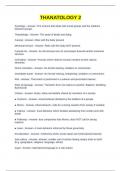THANATOLOGY 2
Sociology - Answer- The science that deals with social groups and the relations
between groups.
Thanatology - Answer- The study of death and dying.
Funeral - Answer- Rites with the body present
Memorial service - Answer- Rites with the body NOT present.
Funeral rite - Answer- An all inclusive term to encompass funerals and/or memorial
services.
Cremation - Answer- Process which reduces human remains to their natural
elements.
Direct cremation - Answer- No formal viewing, visitation or ceremonies.
Immediate burial - Answer- No formal viewing, embalming, visitation or ceremonies.
Rite - Answer- That which is performed in a solemn and prescribed manner.
Rites of passage - Answer- Transition from one status to another; Baptism, Wedding,
Barmitzvah
Culture - Answer- Rules, ideas and beliefs shared by members of a society.
▸ Customs - Answer- social behavior dictated by the tradition of a people.
▸ Mores - Answer- Must-behavior, calls for a strong reaction from society if violated.
▸ Taboos - Answer- must-behavior which dictates abstaining from certain acts with
death
▸ Folkways - Answer- less compulsive than Mores, does NOT call for strong
reaction.
▸ Laws - Answer- A must-behavior enforced by those governing.
Enculturation - Answer- method by which social values are (internalized) learned.
Sub-culture - Answer- division, smaller unit of culture having unique traits to itself.
(E.g.-geographic, religious, language, ethnic)
Argot - Answer- Specialized language in a sub-culture
, Ethnocentrism - Answer- emotional attitude that one's own race, nation, group or
culture is superior.
Industrialization - Answer- change from self-sufficient, independent family units to
employment of family members in jobs outside the unit, making them dependent on
outside resources fro their total needs.
Urbanization - Answer- the change from rural (country) to urban (city)
Bureaucratization - Answer- complications occurring from requirements of a
bureaucratic society.
Religion - Answer- a culturally enriched pattern of behaviors made up of Sacred
Beliefs, Emotional feelings accompanying the beliefs, overt conduct implementing
the beliefs and feelings
The purpose of the funeral service is to - Answer- Provide structure for bereavement
behavior, Give evidence of affection, Affirm the reality of death, Express social
support
Patriarchal - Answer- the father rules the family
Matriarchal - Answer- the mother rules the family
Egalitarian - Answer- male and female share equal rights and duties
Extended (joint) family - Answer- membership within a household includes a father
and mother and all their children, including their son's wives and children.
Nuclear family - Answer- Membership included within a household one man, one
woman and their children (if any).
Single parent family - Answer- One adult, either male or female, and his/her children.
Blended family - Answer- (Brady Bunch) one male, one female and their children
from PREVIOUS marriages and may include children from the present marriage).
Social factors which can affect American Funeral rites - Answer- - Economy, social
stratification, geographic, family structure , religion, Educational level, ethnicity
Social stratification - Answer- categorization of people by money, prestige and
power. (Upper, middle and lower class)
Neo-localism - Answer- The tendency of off-spring to move away from the area they
were born.
Changes in American funeral rites - Answer- Influence of the automobile, airplane,
dispositions (cremation, body donation, entombment, direct burial) and religions.




